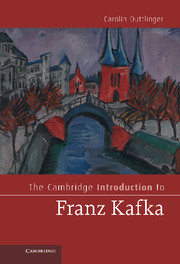2 - Contexts
Published online by Cambridge University Press: 05 June 2013
Summary
Like any writer, Kafka was influenced by his cultural, intellectual and political context. In his diaries and letters he often reflects on events and encounters; the resonances of these experiences in the fiction are subtler and less direct, which has led to the persistent cliché of Kafka as a solipsistic writer whose works bear little relation to their historical context. In the sections that follow, I will single out three configurations which shaped Kafka’s life and times, outlining both the general situation and their specific, personal implications.
The modern city: avant-garde, mass culture, pathology
The early twentieth century was a time of rapid social change, technological modernization and artistic innovation. There was an unprecedented explosion of literary movements, and ‘modernism’ is at best an umbrella term for a variety of co-existing avant-garde movements. Expressionism, Symbolism, Art Nouveau, Dadaism and Futurism pursued contrasting and often conflicting agendas, but they all marked a move away from the tenets of realism and Naturalism, which had dominated the literature of the nineteenth century. Now the focus was no longer on the close, quasi-scientific observation of outside reality but on the depiction of inner states and psychological processes, of fantasies, dreams and desires. At the same time, the texts written around 1900 express a deep sense of crisis – the crisis of the individual lost in an increasingly complex, fragmented world, but also a crisis of language. Many modernist writers and thinkers, including the Austrian authors Hugo von Hofmannsthal and Robert Musil, questioned the ability of language – which by its nature is bound by conventions – to express authentic feelings and experiences. This led to a revived interest in mysticism as a way of overcoming the boundaries of the self and the rational limitations of human existence.
- Type
- Chapter
- Information
- The Cambridge Introduction to Franz Kafka , pp. 8 - 16Publisher: Cambridge University PressPrint publication year: 2013



